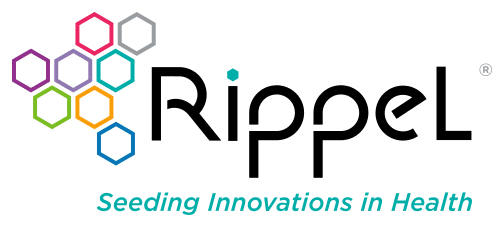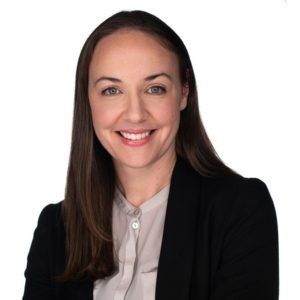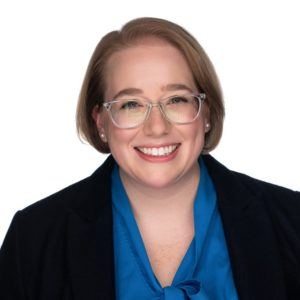Putting Shared Stewardship into Practice: Palm Beach County and 5 Healthy Towns, Michigan
During the last two years, ReThink Health’s Portfolio Design for Healthier Regions (PDHR) team worked with stewards in Palm Beach County, Florida, and a five-town region in southeast Michigan to explore what it will take to reallocate resources to create more equitable regional systems for health and well-being.
Working together, small teams made up of key funding entities created conditions to break down silos and foster mutual understanding and trust, leading to greater interdependence and cohesion across organizations as well as clarity about each organization’s distinct role.
COVID-19 Response Opportunity
One test of what they had learned about shared stewardship and place-based investing came in December of 2020, when the Rippel Foundation offered a $25,000 flexible grant to support each community’s response to the compounding crises of COVID-19. Core team members in each region had three days to collectively agree which organization in their region ought to receive the grant and negotiate its purpose, which was an end-of-year gift given in the spirit of emergency funds.
Site partners were free to choose where the funding would go to advance equitable health and well-being, but none of the partners could be the grant recipient. The PDHR team was interested to observe how the regional stewards made investments together. Would they stay committed to their Simple Rules? How would they weigh opportunities to apply resources to short-term urgent needs vs. long-term vital conditions? What might an investment in Belonging & Civic Muscle look like?
ReThink Health Definitions
Belonging & Civic Muscle: The special capacities of people and institutions that convey to all a sense of being part of a community (belonging) and having power (civic muscle) to influence the policies, practices, and programs that shape the world.
Interdependence: Working together with a common, shared purpose; each organization has clarity about its own distinct, unique role and the roles of others, as well as a holistic understanding of how they interact to create cohesion across organizations.
Shared Stewardship: Taking responsibility for working with others to create the conditions that all people need to thrive together.
Vital Conditions: Vital Conditions are properties of places and institutions that all people need for health and well-being. They include basic needs for health and safety, humane housing, a thriving natural world, meaningful work, lifelong learning opportunities, reliable transportation, and, central to all of these, belonging and civic muscle.
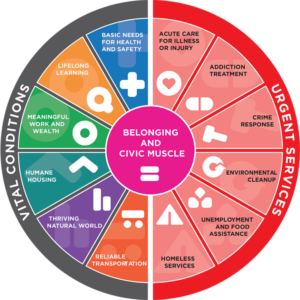
As the Palm Beach County core team partners – Palm Health Foundation, Children’s Services Council of Palm Beach County, and Palm Beach County’s Youth Services and Community Services Departments and BeWellPBC – quickly gathered to share ideas on potential recipients for the Rippel Foundation grant, they turned to their Simple Rules to promote Belonging & Civic Muscle to guide their decision. They looked to how each organization modeled the Simple Rules (see sidebar below) and considered reach into the most marginalized communities. Given the impact of the pandemic on residents, and knowing a vaccine was on the horizon, COVID-19 education, reach, and equitable access were top of mind.
The core team was torn between two organizations, both deeply rooted in equity: T. Leroy Jefferson Medical Society (TLJMS) and the EJS Project, a youth civic engagement organization. In the end, they collectively decided to direct the grant to TLJMS, a network of dedicated minority health care professionals actively working together to improve health and wellness, access to quality care, and academic and career opportunities for underserved populations. TLJMS has great trust and reach in communities of color and was able to leverage their relationships throughout the pandemic to empower residents with knowledge and resources to save lives.
What happened next further strengthened stewardship and the team’s resolve to invest in Belonging & Civic Muscle.
Grantmaking Through the Lens of Stewardship
The partners still wished that funding could go to both TLJMS and the EJS Project, and core team member Tanya Palmer of the Children’s Services Council of Palm Beach County (CSC) asked the question, “Why not?” The partners recognized the impact the EJS Project had made on cultivating Belonging & Civic Muscle among Black youth in Delray Beach, FL, since its founding just five years prior. Both Palm Health Foundation and CSC had previously invested in the nonprofit. Palmer asked CSC’s CEO if they could match Rippel Foundation’s $25,000 grant to invest in the EJS Project. It was an easy yes.
“We viewed this as a synergistic investment, not a CSC project,” said Palmer. “The core team wanted to make local dollars available and take this step toward building the infrastructure around Belonging & Civic Muscle.”
Living by Simple Rules
Understanding that building Belonging & Civic Muscle isn’t tied to any one program, but rather amplifies the work of the EJS Project and lifts up the voices of its youth, Rippel made the terms of the grant very broad and did not proscribe specific outcomes in advance.
“We wanted to recognize that meaningful impact doesn’t always transfer to measurable impact in the traditional sense,” said Palmer. “It’s important when working with youth organizations that we say, ‘you have value, and the work you do has value.’”
The partners also saw how the EJS Project aligned with their Simple Rules—particularly around power dynamics. “We see through the EJS Project the need, willingness and ability of youth to build relationships with community, local government and law enforcement,” said Palmer. “Youth are understanding how policies are made, because if you don’t understand it, you can’t change it. As adults, it’s easy to say, ‘That’s the way it is,’ without questioning. The EJS Project is informing youth how to make change, and there is real power within that.”
Palm Beach County’s Simple Rules To Promote Belonging & Civic Muscle
- Lift up and privilege community voice as a matter of program design, implementation and system transformation.
- Develop bi-directional communication networks that reach everyone, especially the most isolated members of our community.
- Be responsive in the allocation of resources by eliminating bureaucratic barriers and exploring upstream solutions.
- Leverage relationships to amplify resources for greater impact so that no organization is “going it alone.”
- Acknowledge the power dynamics inherent in the gatekeeper role and commit to a partnership with the community to conduct on-going, critical examination of how to dismantle racism and the conditions that hold inequities in place.
Driving Change Through Interdependence
Emanuel “Dupree” Jackson, Jr., founder of the EJS Project, sees the investment in Belonging & Civic Muscle for a grassroots organization like his as a commitment to equity. “It shows that our community appreciates how important it is to support people who are proximate to the issues,” said Jackson. “That proximity has led to an uncomfortable place. It’s about equity. It always comes back to race. But funders have not stepped away. In fact, they have gotten more creative, revved up and more vocal. It is unique to be in a position where people who have leverage and resources invest in residents like me and help build our capacity. It’s given me direction and shows that we are not alone.”
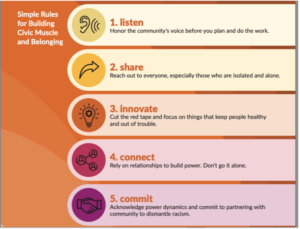
Palmer sees deeper connections between her organization and grantees like Jackson who are building Belonging & Civic Muscle, too. “Now I ask myself, how do we become a part of something without driving it?” she said. “How do we invite in other funders, providers, and residents and let go of some control? We’re learning we don’t have to be the driver. We can become the fuel for the engine grantees’ have already built.”
The quick turn-around investment challenge presented by the Rippel Foundation’s impromptu offer prompted the 5 Healthy Towns region team member organizations — representing a hospital, university health system, philanthropy, and a community-based mental health coalition — to exercise their stewardship skills and commit to a regional effort beyond their own organizations’ individual vested interests. Rather than looking inward at resource and time constraints to figure out how to fit the grant into their existing structures, the core team members were free to look outward at the greater community and explore “what if” scenarios.
For some time, a cohort of organizations in the 5 Healthy Towns region — 5 Healthy Towns Foundation, Washtenaw County Community Mental Health, University of Michigan Family Medicine and St. Joseph Mercy Chelsea Hospital — had been envisioning what it means to look outward through what they call “One Big Thing,” a platform for building resilience, optimism, and engagement community-wide. Depicted in a giant map of the five towns, the concept is to engage everyone in the community in identifying those who are lonely, depressed, and isolated, understanding that residents, places of worship, and other grassroots organizations see and hear things that systems often don’t.
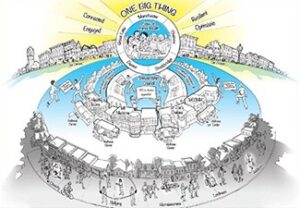
As Amy Heydlauff, former CEO of Michigan’s 5 Healthy Towns Foundation, explains, “It’s getting people down in the shadows up to the alleluia part of the graphic. It’s fully engaging the entire community to embrace and care for everyone. Our hope is that we will draw a circle around everyone, and those circles will become concentric circles, where everyone is aware of, and taking care of, the people closest to them. Those circles then move out to the community, into their neighborhoods and jobs, and the circles get wider with this depth of caring that we are charged with.”
When presented with the $25,000 Rippel Foundation grant, the core team partners had an opportunity to experiment. “The conversation became about how best to use a resource to serve community needs,” said Heydlauff. “There was an idea that was percolating around engaging the faith community in mental health, but no one had the time or the depth to do it. We knew they were a deeply embedded resource that could help us reach isolated community members. As we revisited the concept, each of us had something to contribute and others were open to suggestions. When someone asked, ‘Why don’t we work with NAMI Washtenaw County (the National Alliance on Mental Illness)?’ we all agreed.”
The Freedom to Imagine
By thinking together as stewards, there was a freedom to imagine the grant’s potential and an open-mindedness about who could play a part in solutions. “If we were permitted to have one of our own organizations receive the grant, it would have been a different conversation,” said Heydlauff. “We handled it in a way that was interconnected and took advantage of our networks.” Some had worked with NAMI Washtenaw County in the past to leverage their mental health education, advocacy, and support services. Others had liaisons in the faith community. “The most fun exercise was the networking. When we saw all the connections, we realized the network was this giant spiderweb we should always see in our minds before we do anything,” she said.
Connecting to Rural Communities
Judy Gardner, executive director of NAMI Washtenaw County, most wanted to reach the rural communities where residents often feel forgotten. As a grassroots volunteer-led organization, which until recently had the equivalent of two full-time staff members, NAMI Washtenaw County often has to fight for a piece of the pie when it comes to funding, limiting the organization’s reach. “If you are not providing clinical services, or you are not one of the larger, more well-known organizations, it’s a challenge, even though we’re small and mighty and make an impact on the community,” said Gardner.
Through the Rippel Foundation grant funding, outreach coordinators expanded NAMI Washtenaw County’s FaithNet program to rural areas of the county, promoting mental health education through faith communities where there is trust and a common bond, in a place where resources are often limited. “For residents who have been raising their hands, saying ‘we’re over here,’ this funding lets them know we didn’t forget about them,” said Gardner. “If we have people who are in the margins of our community who can’t participate because of a brain disorder, we have to bring them into the fold.”
